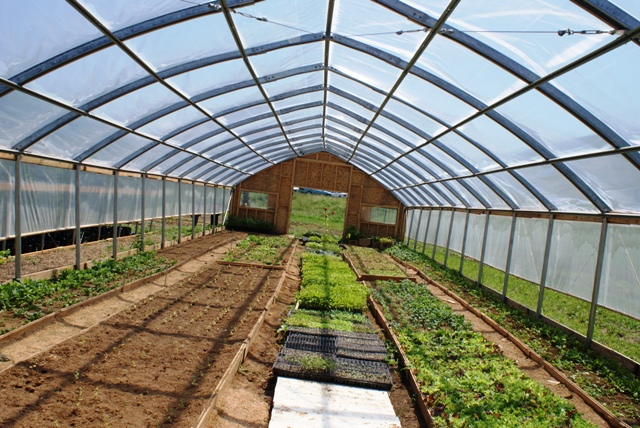
After searching for years and being turned away from a proposed site on the former Countryside golf course property, Roanoke Natural Foods Co-op found what it was looking for. That is, a plot of land suitable for an urban farm, where the Co-op could grow produce to sell in its stores, and ultimately to restaurants and other natural food stores in the area.
That dream has been realized now with 17-acre “Heritage Farm,” at the end of Blue Hills Drive off Orange Avenue/460. The co-op purchased the land from the city and is also leasing 7 acres just up the hill, where a variety of fruits and vegetables will be grown. The first early crops are already yielding produce. There are also free-range chickens laying eggs and beehives producing honey on site.
Co-op staffers and a crew hired just for Heritage Point, located where the Roanoke City mounted police horses used to be stabled, will work the farm. Manager Sean Jordan estimates it will take at least three years before Heritage Point is operating at full capacity.
At a recent ribbon-cutting event featuring 6th District Congressman Bob Goodlatte and Roanoke Mayor David Bowers, the inaugural Farmer’s Market also debuted. A half dozen or more local vendors will be setup at the farm every Saturday from 8am-noon through October. There will also be hours on Tuesday afternoons from 3-6. Local farmers, artists, crafters and cooks can inquire about space at the Farmer’s Market. Eventually people will be able to come out and pick some of their own fruit as well.
James O’Neill is one of a handful of people who work at the farm – one day a week in his case. “We’ve got a lot of leaf lettuce, up on the hill,” noted O’Neill. Not to mention fig trees, tomatoes, cucumbers, spinach, squash, etc. “There’s more to go in,” said O’Neill. Greenhouses are being employed for plants started before the growing season; Co-op employees helped build them. “It’s been a huge effort…and it’s something I wanted to be a part of. It’s something really special.”

Marketing coordinator John Bryant said it was a ten year-plus quest to find a plot of land that they now claim is the largest contiguous urban farm in the country. Once the Co-op withdrew its proposal to put the farm on the Countryside tract – in the face of neighborhood opposition – Bryant said the sentiment was, “we have to keep going with this. The [Heritage Point] property was really kind of calling to us.”
The land was purchased in October and the planting started in February. Some of the property is hilly and cannot be farmed. More than 100 hens are already laying eggs that are being sold at the Co-op. Bryant was excited that more than 200 people came out for the ribbon cutting and he hopes many of them keep coming back. One of the oldest structures in Roanoke City – a farmhouse that dates back to the 1840’s perhaps – also sits on the property.
Growing their own crops gets the Co-op even closer to its mission. “I think it speaks to what we are about as a store,” said Bryant, “ a grocery store that respects the environment and social issues. We want to make money [also] so we can be sustainable.”
Co-op employee Elizabeth Wilson, the Co-op Human Resources Director was manning one of the Farmer’s Market booths on opening day. She remembers talking 15 years ago about where the Co-op wanted to go: “this is one of the things that came to mind.”
General Manager Bruce Phlegar said the Co-op worked with the city for two years before finding Heritage Point. “Everyone seems to find something they like about it – their grandmother had chickens, their grandfather had a John Deere tractor – some connection to the past. I see that over and over again. This is just the tip of the iceberg. It’s going to take us five years to build this out.”
Farm Manager Sean Jordan was the produce manager for the Co-op before taking on his newest role. He spent twenty years farming in Idaho. “When I came here I thought my farming days were over but for a long time this Co-op has had a dream of doing this. We got to the point where the business was financially stable enough to contemplate it.” The end result of that stability can be seen at Heritage Point.
(See heritagepointfarmroanoke on Facebook or call the Natural Foods Co-op for more information.)
By Gene Marrano

